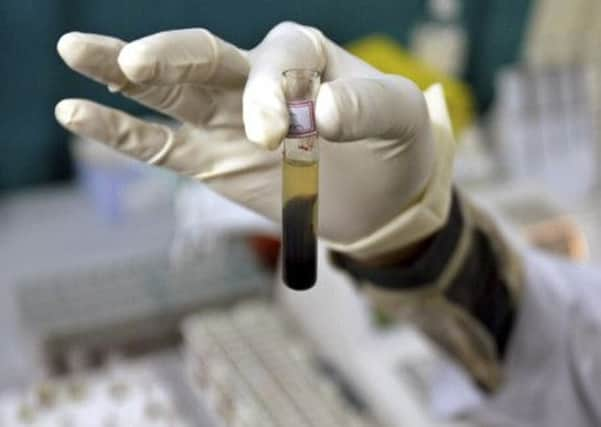Test predicts Alzheimer’s ‘with 90% accuracy’


The test looks at changes in the blood which indicate a patient could experience dementia caused by Alzheimer’s or milder forms of memory loss within the following three years.
It is hoped the test – which could predict the disease with 90 per cent accuracy – may be ready for use in clinical trials within two years.
Advertisement
Hide AdAdvertisement
Hide AdThere are around 88,000 people living with dementia in Scotland, but this is predicted to rise to 164,000 by 2036.
Campaigners welcomed the latest research, but said the prospect of a predictive test raised ethical issues that needed to be addressed.
The latest study, published in the journal Nature Medicine, identified ten lipids – or fats – in blood which could indicate whether people will go on to develop mild cognitive impairment or Alzheimer’s in two to three years.
The researchers, from Georgetown University Medical Centre in Washington DC, examined 525 participants aged 70 and over and monitored them for five years.
At the start of the study 46 people were diagnosed with either mild Alzheimer’s disease – the most common cause of dementia – or a condition known as amnestic mild cognitive impairment (aMCI), where people have problems with memory.
During the study a further 28 participants went on to develop either of the conditions.
Halfway through the research, the authors selected 53 patients who already had mild Alzheimer’s or aMCI and 53 “cognitively normal” people.
They discovered ten fats in the blood which the scientists said appeared to reveal the breakdown of “neural cell membranes” in participants who developed symptoms of cognitive impairment or Alzheimer’s disease.
Advertisement
Hide AdAdvertisement
Hide AdThese cells pass messages from one part of the body to another.
They then tested other participants’ blood to see whether these biomarkers could predict whether or not they would go on to develop the conditions.
By measuring the presence of the ten fats the researchers could predict with 90 per cent accuracy which people would go on to suffer from aMCI or Alzheimer’s.
UK charities welcomed the findings, but stressed thatfurther work was needed before a test was made widely available.
Dr Doug Brown, directorof research and development at the Alzheimer’s Society, said: “Having such a test would be an interesting development,but it throws up ethical considerations. If this does develop in the future, people must be given a choice about whether they would want to know, and fully understand, the implications.
“This research could alsogive clues on how Alzheimer’s disease occurs and warrants further study, but as such a small number of people showed dementia symptoms there need to be larger studies with different populations before it could be turned into a blood test for Alzheimer’s disease.”
June Andrews, professor in dementia services at Stirling University, cautioned: “There are lots of different causes of dementia and not just Alzheimer’s disease.
“On one level this research is good news, but on another we have to be aware of the fact that it could be some time before it is possible to do early warnings of the fact that people are going to have Alzheimer’s disease.”
COMMENT
Advertisement
Hide AdAdvertisement
Hide AdKirsty Yanik: Early warning system in the battle for health is welcome
THIS is really interesting research. One of the greatest achievements in battling dementia would be the ability to diagnose it at the earliest possible stage.
The slightly low numbers of people being picked up for potential aMCI or Alzheimer’s disease out of the original cohort of 500-plus people over 70 suggests that this test is not foolproof.
However, this development is definitely something that Alzheimer Scotland will be following with a great deal of interest.
In April 2013, the Scottish Government introduced a guarantee of one year’s post-diagnostic support; this means that a named worker will support the person diagnosed – and those closest to them – to make vital decisions about future care needs and legal planning, such as drafting a power of attorney, as well as coping with the illness and maintaining social and community networks.
However, to work most effectively that model relies on diagnosis happening at an early stage in the illness; something Scotland and most other countries currently struggle with.
If this test is developed into a recognised and adopted method for diagnosing people at a pre-symptomatic stage of Alzheimer’s disease, there
would have to be a system in place to support people who have been given this life-changing news. Especially as we don’t yet have any treatment to arrest the illness before symptoms occur; current treatments for Alzheimer’s disease primarily work to moderate symptoms and do not work for everyone.
• Kirsty Yanik is spokeswoman for Alzheimer Scotland